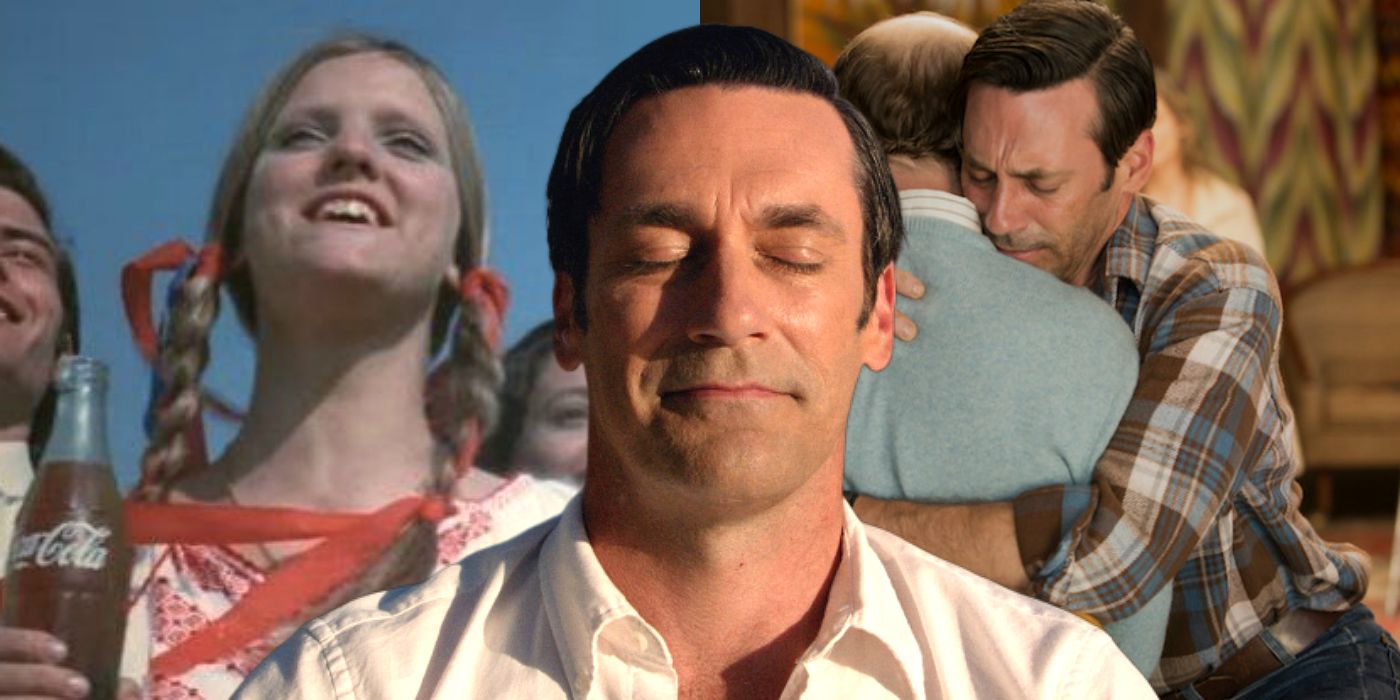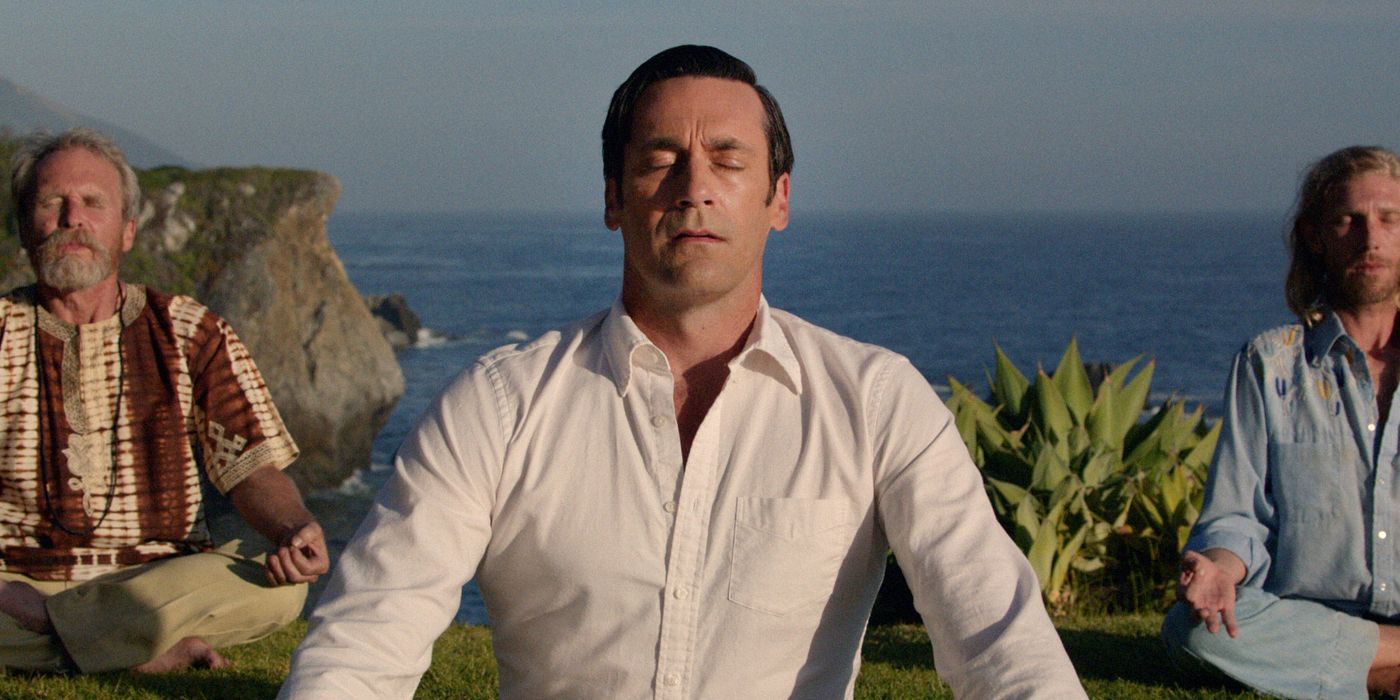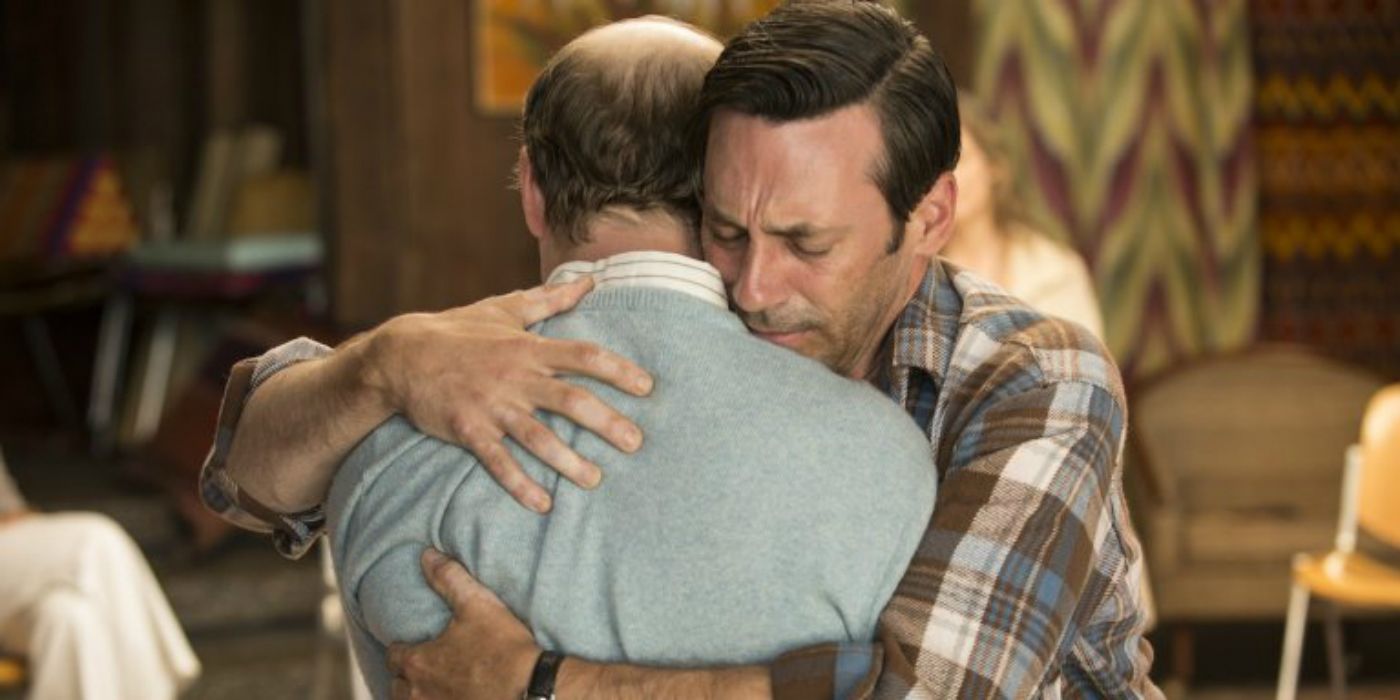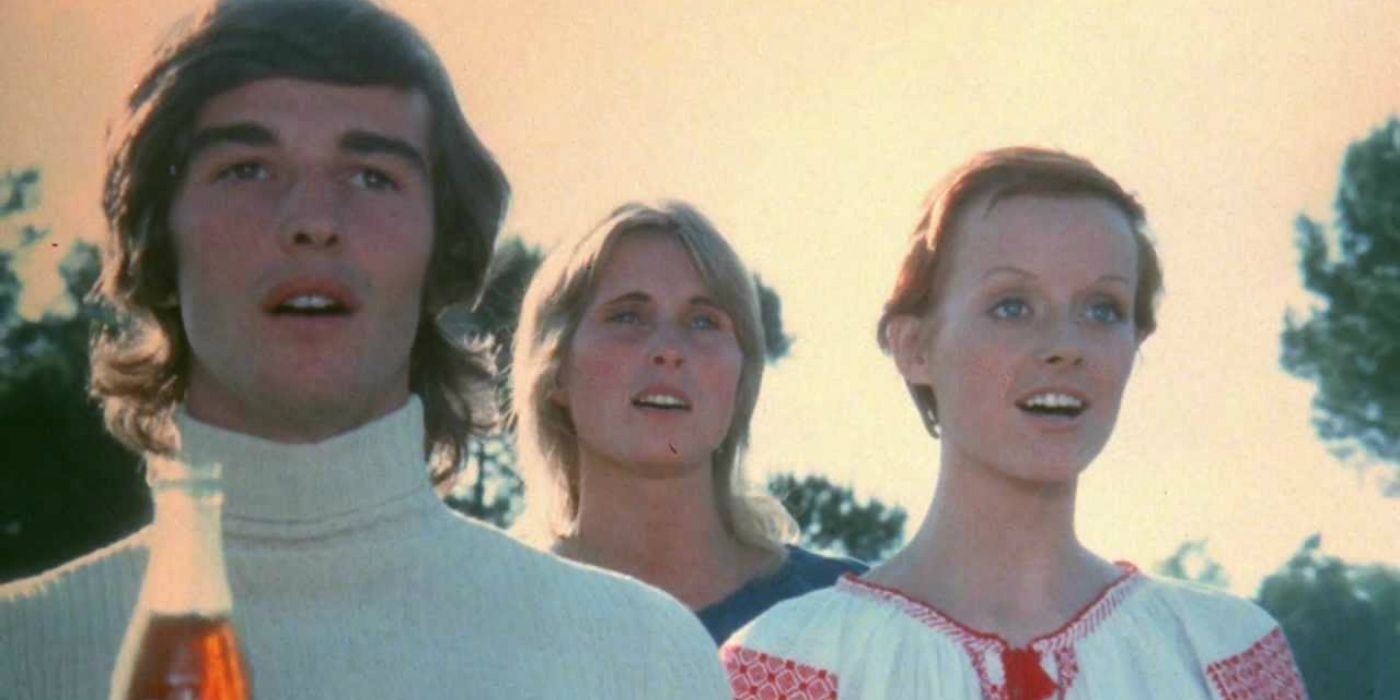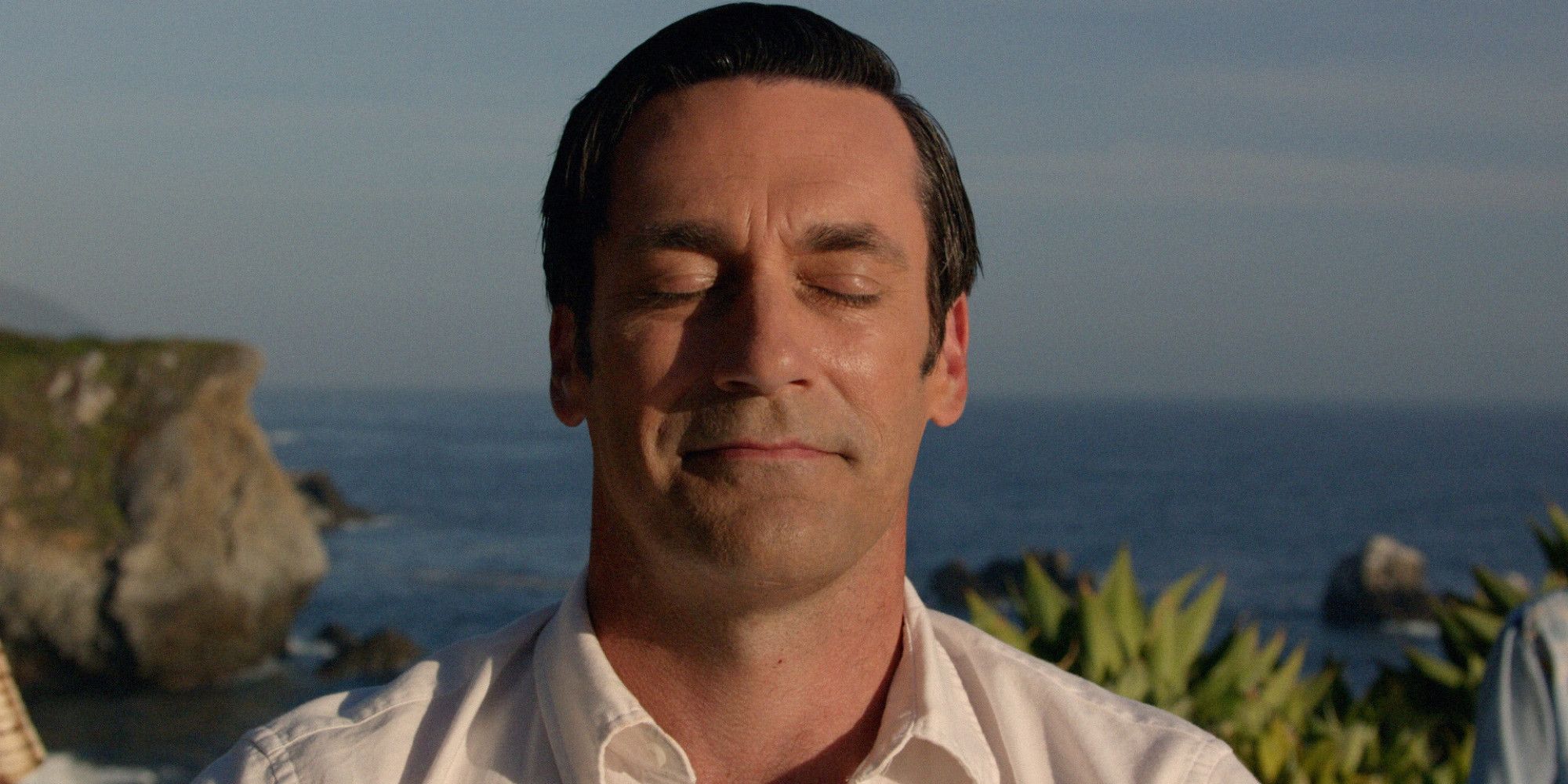Mad Men's ending is one of TV's most-discussed, ambiguous, and even controversial, but what happens to Don Draper (Jon Hamm) in the series finale, and what does it all really mean? The show's climax wasn't quite as dramatic as viewers had been expecting, but that just helped make it an even more perfect way for the AMC series to bow out.
Debuting back in 2007, Mad Men - created by Matthew Weiner (The Sopranos) - took place primarily in the 1960s, focusing on the advertising people working on New York's Madison Avenue. Running for seven seasons and 92 episodes, Mad Men is one of the very best shows of TVs Golden Age, as evidenced by it winning the Emmy Award for Outstanding Original Drama in each of its first four years, although even with that it's arguable the series doesn't quite receive the attention or reverence it deserves.
What's less debatable is that Mad Men's ending caused quite a stir when it aired in 2015, and four years on it remains the subject of a lot of theorizing and controversy. Here's what happens to Don Draper in the Mad Men series finale, and why it was such a brilliant way to end the show.
How Mad Men's Series Finale Ends
The final season of Mad Men is largely concerned with pushing Don Draper towards...something. It’s never exactly clear what that is, which is why there were theories ranging from Don being DB Cooper to him falling (or jumping) out of his office window to his death. In the end, it does something a little quieter, more subtle, and very much in keeping with Mad Men as a whole.
In "Person To Person", the series finale of Mad Men, Don goes to a retreat in California, in an effort to find some kind of enlightenment after all the pain and suffering his lies have caused not only himself, but just about everyone he’s ever come into contact with. Elsewhere, Mad Men’s ending attempts to give relatively happy conclusions for most of the other characters: Peggy decides to stay at McCann Erickson, Joan starts her own production company, Roger is happily married to Marie, Betty is dying, but she's doing it on her terms as much as possible, and Sally and the boys are going to be ok. And yet it all comes back to Don.
So much of the Mad Men finale is spent on him and the people closest to him, including tear-jerking phonecalls with Sally, Betty, and Peggy. It then finds Don at that same retreat, dressed in white, during a moment of group meditation. He had a slight smile on his face, it’s incredibly peaceful, and maybe he really has found peace. But then Mad Men cuts to the iconic Coca-Cola "Hilltop" advert from 1971, and we’re left wondering if Don simply went back to work and made one of the most famous ads ever, or if he really did find himself, or both?
Did Don Draper Find Inner Peace?
Throughout the entire run of Mad Men, Don Draper was a troubled soul. Running from his past as Dick Whitman, he constantly turned to alcohol and women in order to either make himself feel better (or at least just feel something), to find what he was missing, and in search of fleeting moments of joy. He married a couple of times, but Don could never be truly happy with anyone else until he learned to be truly accepting of who he is.
That’s where the Mad Men finale comes in, with Don’s retreat centered around him finding not just a sense of purpose, but an idea of who he really is and being happy with that. So as Mad Men ends, with a smiling Don seemingly finding spiritual side, did he achieve true inner peace?
The Coke advert suggests maybe not. That Don instead simply went back to being Don, and doing the one thing he was always good at. That he hadn’t really changed all that much. But then there’s the conversation with Leonard, which is in many ways the turning point of this episode, and a major milestone in the life of Don Draper/Dick Whitman. Hearing Leonard’s story of feeling overlooked and unloved causes Don to break down crying, recognizing himself in those words. That’s a rare and huge moment of self-reflection for Don, and is what leads him to the group mediation and that smile on his face. Sure, he might’ve gone back to New York and created the advert, but he’s also not the same Don Draper who left it behind.
Did Don Draper Create The Coke Advert?
When the camera zooms in on Don Draper’s smiling face in the Mad Men series finale, we hear a bell ring. What does it mean? It is, most likely, an idea coming to Don, that of the Coke advert. It isn’t hard to make the connection between the two: looking at the “I Want To Buy The World A Coke" advert, there are numerous similarities to the commune Don is at, which are without a doubt deliberate, no matter how ambiguous the rest of it is.
The clothes are the same, the people look similar, it’s at a place called the Hilltop, and even the idea of having a coke is related to something Leonard told him in that all-Important speech, describing himself as an item in a refrigerator that no one ever selects. Taking that, and making it into sharing a Coke with everyone around you, is advertising genius. There's also his conversation with Peggy, who tells him to come home and work on the Coke advert, which further suggests that's exactly what Don did, especially since the company they're working for - McCann Erickson - really did create the Coke ad in real life (with Bill Backer the man behind it). In the episode previous, Don fixes a Coke machine.
Having worked on The Sopranos, however, Matthew Weiner knows the power of an ambiguous ending. He’s strongly hinted that Don did indeed create the Coke advert, telling TVLine just after the finale aired: "The idea that some enlightened state, and not just co-option, might’ve created something that is very pure." It’s nonetheless left open to interpretation within the text itself though. And even if he did create the Coke ad - which is almost a certainty - there are different readings into what that itself really means. After all, if it was simply a case that Don went back to normal in New York and made the Coke advert, then Weiner could've just shown that, but he wanted viewers to read a little closer into what happens in Mad Men's ending.
How Mad Men Gave Don The Perfect Ending
Don Draper (maybe) finding inner peace and also (maybe) creating the iconic Coca-Cola advert, with both very likely albeit not explicitly confirmed, makes for a perfect ending to Mad Men and Don's entire character arc. For Mad Men as a show about both advertising and the changing nature of America through the 1960s, then there's nothing better to end on than Coca-Cola's "Hilltop" advert. It's one of the most famous ads ever made, but also linked to the ending of the decade and, somewhat more cynically, how big corporations began to cash-in on counter-culture.
Mad Men's ending, though, isn't actually all that cynical, even if it's a fair reading. It buys into the earnestness of the Coke advert - Weiner has said as much himself - and that itself is linked to the change Don undergoes in the final season. Mad Men delivers a finale that is about hope, both real and manufactured. In the endings of almost all the major characters, hope is a recurring element. It's surprisingly sweet for the show, and yet it underlines one of its central facets: change. We've watched so much of Don's surroundings move around him, while he often felt like a man who was stuck.
By finding a sense of enlightenment, he's able to create the Coca-Cola advert. But Don's also able to reach out, help others, and finally even help himself. He is able, at last, to make genuine human connections, and to create something that has a real impact too. Don is great at advertising, but now he's finally found a way to balance that with a way of making himself and others happy in all walks of life. In Mad Men's ending, Don not only creates an all-time great advert, but most importantly, he's able to change, and that's what makes it such a perfect way to go out.

